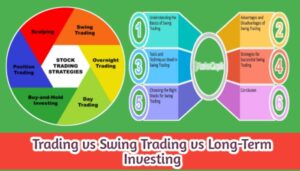Investing in the US stock market has always been an attractive opportunity due to its size, liquidity, and global influence. Non-US residents increasingly seek access to US stocks, ETFs, mutual funds, and other investment instruments. However, opening a brokerage account in the United States as a non-resident involves unique requirements, regulations, and processes.
Having a US brokerage account allows international investors to diversify their portfolios, access high-quality securities, and take advantage of the stability and transparency of the US financial system. This guide explains how non-US residents can open and manage a brokerage account effectively.
1. What is a Brokerage Account?
A brokerage account is a financial account that allows investors to buy, sell, and hold securities like stocks, bonds, ETFs, and mutual funds. It is managed by a broker, which acts as an intermediary between the investor and the stock exchanges.
Features of a Brokerage Account:
- Ability to trade US stocks and other securities
- Access to research tools and market data
- Option to use margin (borrowed funds) for trading
- Portfolio tracking and reporting
For non-US residents, brokerage accounts may have slightly different requirements and restrictions compared to domestic investors.
2. Importance of Brokerage Accounts for Non-US Residents
Non-US residents open US brokerage accounts for several reasons:
- Access to Global Markets: Direct exposure to US equities and ETFs.
- Diversification: Reduces dependence on the domestic stock market.
- High-Quality Investments: Invest in globally recognized companies like Apple, Microsoft, and Amazon.
- Advanced Trading Tools: Many US brokers offer superior research platforms.
3. Eligibility Criteria for Opening a Brokerage Account
Eligibility varies by broker, but common requirements include:
- Must be 18 years or older
- Valid passport or government-issued ID
- Proof of residential address
- Tax identification number (TIN or equivalent in your country)
Some brokers may have restrictions based on your country of residence due to regulatory or legal reasons.
4. Types of Brokerage Accounts Available
Non-US residents can typically choose from:
| Account Type | Description |
|---|---|
| Cash Account | Basic account funded entirely with your own money; no borrowing. |
| Margin Account | Allows borrowing funds from the broker to increase buying power; higher risk. |
| Retirement Account (IRA) | Some brokers may allow retirement accounts for US residents only; usually restricted for non-residents. |
| Custodial/Minor Accounts | Managed for minors by a guardian; less common for international investors. |
5. Choosing the Right Broker as a Non-US Resident
When selecting a broker, non-US residents should consider:
- Regulation: Ensure the broker is regulated by authorities like SEC or FINRA.
- International Acceptance: Some brokers accept clients from most countries; others have restrictions.
- Fees and Commissions: Trading costs can impact profitability.
- Ease of Account Opening: Online applications are often faster and simpler.
- Trading Platforms: Availability of web, mobile, and desktop platforms.
Examples of Brokers Accepting Non-US Residents:
- Interactive Brokers
- TD Ameritrade (limited countries)
- Charles Schwab International Account
- Fidelity (for select countries)
6. Required Documentation for Non-US Residents
Opening a US brokerage account as a non-resident typically requires:
- Valid Passport – Primary identification.
- Proof of Address – Utility bill, bank statement, or rental agreement.
- Tax Identification Number (TIN) – From your home country.
- W-8BEN Form – US IRS form certifying non-resident status for tax purposes.
- Bank Account Details – For funding the brokerage account.
7. Account Opening Process
The general steps include:
- Select a Broker: Check international availability and fees.
- Fill Application Online: Provide personal information and identification documents.
- Submit Tax Forms: Complete W-8BEN or other required forms.
- Fund the Account: Transfer money via international wire, ACH, or online transfer.
- Start Trading: Once verified, you can begin investing.
8. Funding Your Brokerage Account from Abroad
Non-US residents can fund accounts using:
- Wire Transfers: Secure and widely accepted.
- Online Payment Services: Some brokers accept services like PayPal or TransferWise.
- Foreign Bank Accounts: Must comply with international banking rules.
9. Tax Implications for Non-US Residents
Non-US investors must understand US taxation on investments:
- Dividend Withholding Tax: Usually 30%, but can be reduced under tax treaties.
- Capital Gains Tax: Generally, non-residents are not taxed on US stock capital gains.
- Estate Tax: US-situated assets may be subject to estate taxes.
Example Table – Tax Implications:
| Type of Income | US Tax for Non-Resident | Notes |
|---|---|---|
| Dividends | 30% (may reduce to 15% via treaty) | Withholding applied automatically |
| Capital Gains | 0% for stocks | Excludes real estate & some specific investments |
| Interest | Generally 30% | Depends on US source & treaty |
10. Trading Options Available
Non-US residents can access:
- Stocks – Shares of US companies.
- ETFs – Diversified exposure across sectors or indices.
- Mutual Funds – Pooled investment products (some brokers restrict for non-residents).
- Options & Futures – Derivatives trading (higher complexity).
- Forex & Bonds – Not all brokers provide access internationally.
11. Regulatory Considerations for Non-US Investors
- Brokers must comply with SEC, FINRA, and CFTC regulations.
- Anti-money laundering (AML) and know-your-customer (KYC) rules are enforced.
- Non-US residents must disclose tax residency and complete W-8BEN to avoid legal issues.
12. Pros and Cons of Opening a US Brokerage Account
| Pros | Cons |
|---|---|
| Access to high-quality global securities | Documentation can be complex |
| Diversification of portfolio | Currency conversion fees |
| Advanced trading tools and research | Limited broker options for some countries |
| Potential for high returns | Understanding US tax rules is necessary |
13. Alternatives to US Brokerage Accounts
If a US account is challenging, non-residents can explore:
- International Brokers: Interactive Brokers, Saxo Bank, DEGIRO
- Local Brokers with Global Access: Some local brokers provide access to US markets.
- Global ETFs/ADR Funds: Indirect exposure to US stocks without opening a US account.
14. Risks and Challenges for Non-US Residents
- Currency Risk: Exchange rate fluctuations may affect returns.
- Regulatory Risk: Some brokers may restrict accounts due to country regulations.
- Tax Compliance: Mistakes in reporting US-source income can result in penalties.
- Access Limitations: Certain investment products may be unavailable to non-residents.
15. Online Brokers vs Traditional Brokers for International Investors
| Feature | Online Brokers | Traditional Brokers |
|---|---|---|
| Account Opening | Fast, online | Slower, paperwork-heavy |
| Fees | Usually lower | Higher fees and commissions |
| Platform | Advanced, mobile-friendly | Limited online tools |
| Access for Non-Residents | Often available | Rarely available |
16. Currency Conversion and International Transfers
- Funding a US account requires converting your home currency to USD.
- Brokers may charge a conversion fee or offer mid-market rates.
- Consider banks or transfer services with low fees and reliable speed.
17. Understanding Fees and Commissions
Typical fees for non-US investors include:
- Trading Commissions – Fixed per trade or per share.
- Account Maintenance Fees – Monthly or annual.
- Wire Transfer Fees – For funding and withdrawal.
18. Tips for Safe and Successful International Trading
- Always choose regulated brokers.
- Use risk management strategies like stop-loss orders.
- Keep track of tax obligations in both the US and your home country.
securities. It allows international investors to participate in one of the world’s largest and most liquid markets. However, it requires careful consideration of documentation, taxes, fees, and regulatory compliance.
For non-US residents, the key is to choose the right broker, understand currency risks, and adhere to all tax and legal obligations. While there are challenges, the benefits of accessing US stocks, ETFs, and other investment options often outweigh the drawbacks, especially for investors looking to diversify globally.
Summary Table – Considerations for Non-US Residents:
| Aspect | Key Points |
|---|---|
| Broker Selection | Ensure international acceptance, regulation, and low fees |
| Documentation | Passport, proof of address, TIN, W-8BEN form |
| Funding | Wire transfers or online payment services; watch currency conversion fees |
| Trading Options | Stocks, ETFs, mutual funds, options, forex (depending on broker) |
| Taxation | Dividend withholding tax, potential capital gains implications, estate tax |
| Risks | Currency fluctuations, limited access to some products, regulatory issues |
Final Advice:
- Start small and gradually increase investments as you gain confidence.
- Maintain a diversified portfolio to reduce risk.
- Stay updated on both US market trends and your home country regulations.
- Use technology wisely: trading platforms, research tools, and alerts can help manage investments efficiently.
Opening a US brokerage account as a non-resident is not just for high-net-worth individuals; with proper planning and due diligence, international investors at almost any level can participate and benefit. It’s a strategic way to access global markets, enhance diversification, and take advantage of one of the world’s most stable financial systems.

















